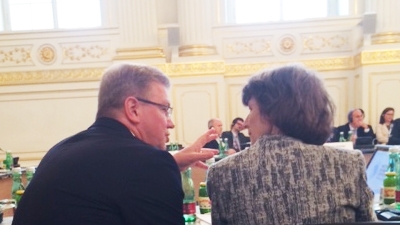
One of the key challenges in both countries is the flooding of mines that supply coal to their main power plants. In Serbia, flooded mines supply the coal needed for about one third of the country’s power generation, and one of these mines is currently under 60 meters of water. It could take nine months to pump and repair this mine, making the import of fuel or electricity a priority. While the short-run impact of the floods is clearly negative, flood recovery and reconstruction can be expected to boost growth later in 2014 and into 2015.
Accelerated and sustained growth in the Western Balkans is critical. Citizens of these countries aspire to living standards on par with those of the European Union, and this is natural. The EU is the largest economic bloc in the world - larger than the economies of the US or China - and economic integration with Europe for these countries is key to their prosperity. This is true regardless of the timing of their formal membership in the European Union.
Governments in the Western Balkans aim to accelerate growth to raise people’s incomes closer to EU levels, that is - to achieve income convergence with the EU. In the decade before the global financial crisis, they made fantastic progress toward income convergence.Their economies grew faster than those of EU countries, narrowing the income gap. But, this process of income convergence has ground to a halt since the global financial crisis, leaving per capita incomes in the Western Balkans at only 30 percent of EU levels. The Western Balkan countries experienced a double dip recession between 2008 and 2012, with only a modest recovery of about 2 percent in 2013. Reaching EU income levels will require decades of strong growth (an estimated 6 percent per annum to reach convergence by 2040). Reaching these kind of growth rates will require truly deep and sustained economic reforms.
Besides the income gap with the EU, these countries face social challenges. About one-third of households in the Western Balkans live in moderate or extreme poverty - with an average of 9 percent living in extreme poverty. These rates are more than double those of the new EU member states, and we have evidence of increasing poverty in all countries since the crisis.
On average, about one in four economically-active individuals is unemployed. And only about half of the working age population participates in the labor force. This is an extremely low level by European and global standards. Persistently high unemployment rates, chronic unemployment and inactivity disproportionately affect youth, low-skilled workers and vulnerable groups. The countries of the Western Balkans have the highest youth unemployment rates in the world. This is a serious concern, as it creates the risk of a lost generation of workers. If this generation can’t be integrated into the labor force - despite its higher educational attainment and “new economy” skills - these countries could lose the opportunity to benefit from their most productive generation to date.
In designing their economic reforms, authorities in Western Balkan countries will need to look beyond current economic challenges and take into account their national demographic trends. In all countries except Kosovo, populations are shrinking and aging. Western Balkan countries rank among the highest in the world for exporting people. One quarter of the people from Southeast Europe lives outside their home countries - compared to three percent in the rest of the world. Emigration and an aging population complicate the aspirations for both rapid economic growth and fiscally sustainable social protection systems - including pensions.
Within this context, the World Bank has pursued a dialogue with the countries of the Western Balkans on economic reforms focused on four priorities:
- First, restoring macroeconomic and fiscal stability;
- Second, improving competitiveness and connectivity;
- Third, enhancing skills and labor productivity especially for youth, and
- Fourth, strengthening governance and reducing corruption.
Let me briefly touch on each of these areas.
There are no quick fixes to restore macroeconomic and fiscal stability in the Western Balkans. Acute fiscal constraints won’t allow for an additional stimulus response. Especially Albania, Montenegro, and Serbia find themselves with high levels of public debt - over 60 percent of GDP - and in vulnerable budgetary positions. Finance ministers in the region are in an unenviable position, as fiscal consolidation efforts will have to take place against considerable social pressures on public salaries, pensions, and social assistance. And, these countries can’t afford to sacrifice the priority public investments they need for growth and convergence.
Strengthening macroeconomic stability and fiscal sustainability will require decisive consolidation efforts. Careful prioritization of government spending and improved targeting of social assistance will be needed to make sure that scarce resources support economic growth and employment, and protect the most vulnerable members of society. This is going to be a tough path to follow, but some are courageously taking it on. I have been impressed by the efforts of the Albanian Government to tackle medium-term fiscal consolidation, reduce public sector arrears, introduce important financial management reforms, and address the deep underlying problems in the public utilities.
The second priority for economic reform is to improve competitiveness and connectivity. The countries of the Western Balkans would be well served by a long-term growth model anchored in domestic productivity gains and export-led growth. In all six countries, low rates of employment reflect their narrow production base and high external deficits. Goods and services made in the Western Balkans are often not competitive, even on domestic markets. Firms tend to be constrained by deficiencies in public infrastructure, institutions, and the implementation of laws.
Enhancing competitiveness will require a range of reforms. These include things like strengthening the financial sector and dealing with high levels of non-performing loans to restore credit growth to the private sector. They also include the restructuring of state-owned enterprises, increasing labor market flexibility - while protecting workers’ safety and rights - and improving the investment climate. Key investments in energy and transport infrastructure will also be needed to get the benefits of integration with European markets.
Some countries in the region have pursued investment climate reform with vigor, hoping to unleash the potential of their private sector. Macedonia has been one of the top reformers in removing administrative barriers to businesses. Last year it ranked in the top 25 countries worldwide - ahead of many EU member states - on the World Bank's Ease of Doing Business Index. Private investment has increased since the reforms, and we are starting to see net gains in skilled employment.
The third reform priority for economic recovery in the Western is enhancing skills and labor productivity. Prolonged unemployment of youth can delay or prevent the accumulation of on-the-job skills and permanently reduce their future employment prospects and earnings. This translates into a risk that today’s unemployed youth will become less productive later in life, which in turn can be expected to have a negative impact on economic growth. Enhancing skills and labor productivityare key steps. Kosovo, where youth unemployment is the highest, has made significant progress in broadening access to education and putting in place systems to improve learning outcomes.
The final priority for economic reforms focuses on strengthening governance and reducing corruption across sectors and institutions. The Western Balkans continues to lag significantly behind EU member states on all major indictors of governance. Relevant reforms include measures to strengthen the independence and quality of regulatory and oversight bodies, and streamlining regulations and administrative processes to reduce opportunities for rent-seeking behavior. Effective governance will also require public procurement systems that foster competition, financial management practices that are transparent and subject to regular audits, a meritocratic civil service, and transparency and accountability at every level of government. Specific governance reforms can lead to large gains. Serbia's recent reform of its pharmaceutical procurement, for example, has saved 25 million Euros - or 27 percent of its annual budget for purchasing medications.
These four priorities for economic reform may seem daunting but, without them, convergence with the EU is likely to remain elusive. Unfortunately, the financial crisis proved to be a missed opportunity for the Western Balkans, as reforms in the immediate aftermath were weak. Now that economic recovery is underway, it is a good time to re-launch and intensify the actions needed to put the economies of the Balkans on a path to sustained growth and convergence with the EU.
The recent devastation of the floods only increases the urgency of actions to stimulate growth and employment in Serbia and Bosnia and Herzegovina. Coordinated international action to support rapid recovery and reconstruction from the floods is necessary. At the World Bank, we are working closely with the European Union and the United Nations to conduct comprehensive Damage and Loss Assessments in both countries. Teams in critical sectors like power and transport are already on the ground. We have invoked emergency procedures that allow rapid reallocation of undisbursed funds from our portfolios totaling around 640 million Euros across the two countries. These procedures also allow us to retroactively finance critical expenditures made today by Governments as they shift from relief to recovery. We are also preparing an emergency recovery operation for Bosnia and Herzegovina of around 70 million Euros from our soft-lending Crisis Response Window. This operation would finance critical goods (like fuel or electricity imports) and reconstruction of local infrastructure. Finally, we just approved in May the Drina River Flood Protection Project in Bosnia and Herzegovina, and hope to scale up our support for longer-term flood protection and disaster risk management in the Western Balkans.
This immediate response is designed to mitigate the negative impact of the floods on social welfare, and put flood-affected countries back on a reform path aimed at faster growth and greater job creation. This is the path that will allow the Western Balkans to achieve their aspirations of European integration and improve the lives of their citizens.



